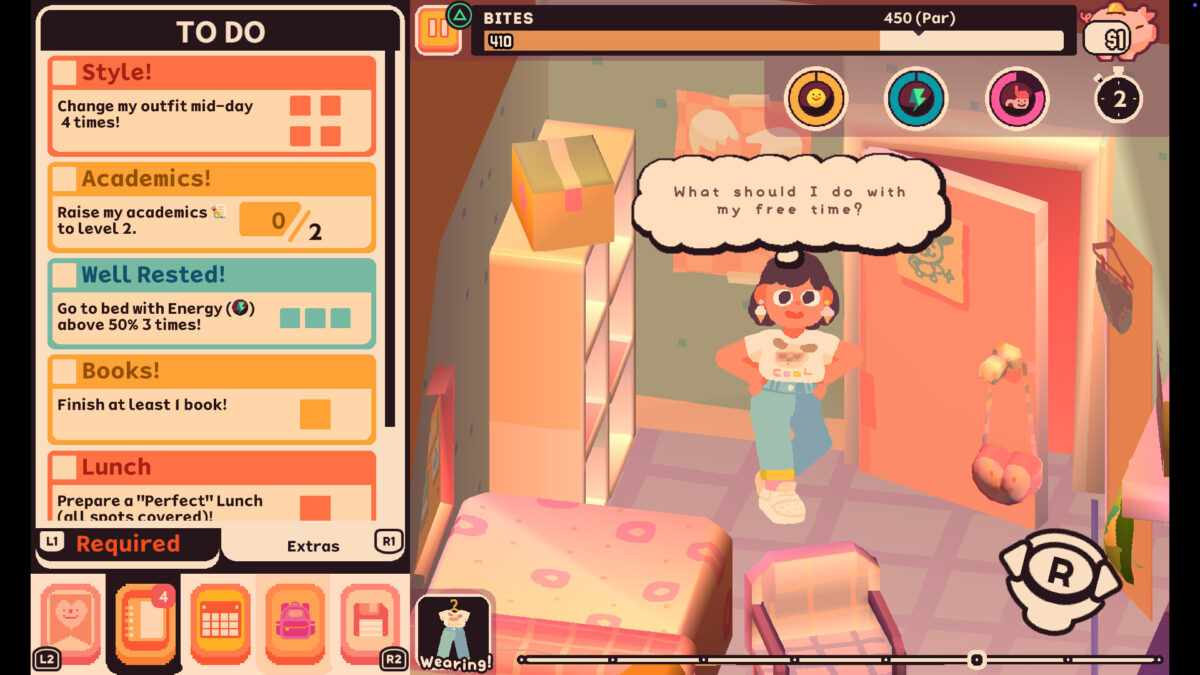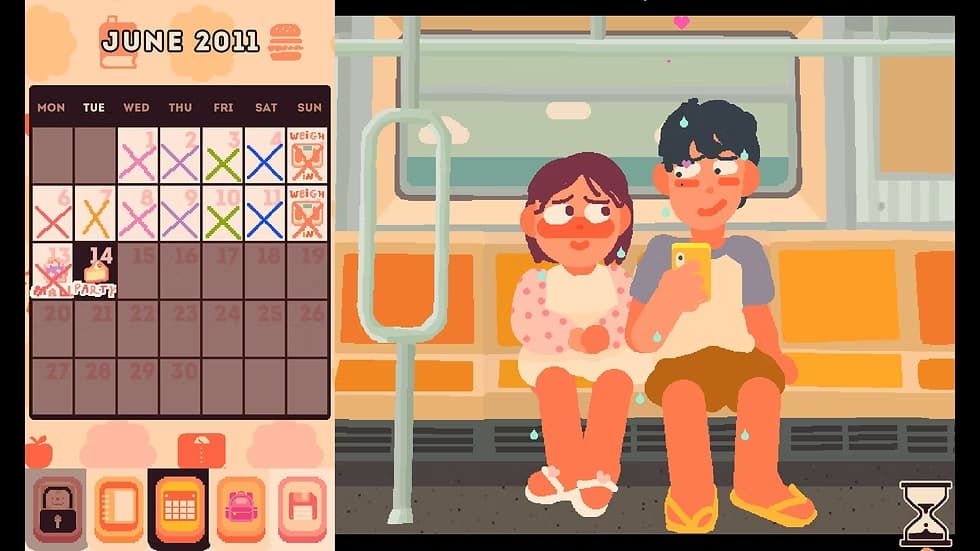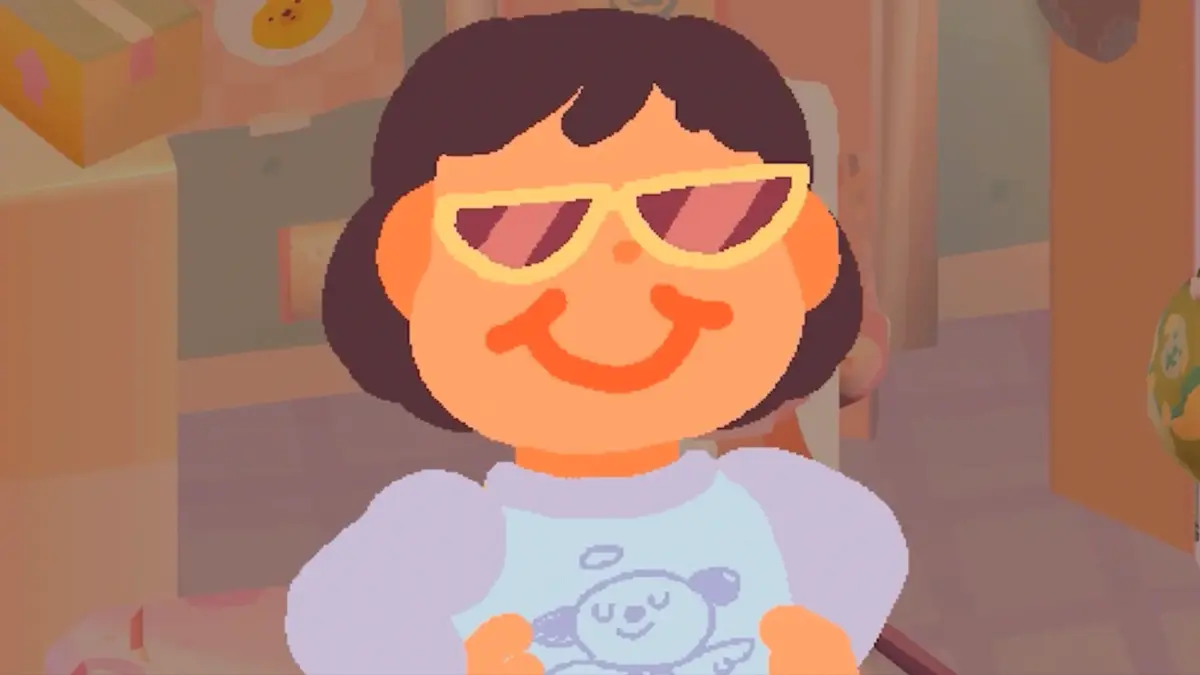Warning: This review briefly touches on minor aspects of the game’s ending.
You wouldn’t expect a game that its own creators say is about feeling insecure and awkward in high school to be a smash hit, but that’s Consume Me for you. This indie life-sim RPG came out of nowhere and cleaned up at the 2025 Independent Games Festival, winning the top Seumas McNally Grand Prize and a bunch of other awards. It quickly became one of the most talked-about games of the year.
Consume Me is based on the real-life teenage diaries of its lead developer, Jenny Jiao Hsia. You play as Jenny, a high school senior back in 2011, during the summer before her final year. After her mom makes a casual comment about her weight, Jenny’s world shrinks. She decides she needs to improve herself, driven by pressure from society, a new crush, and, most of all, the person staring back at her in the mirror.
What makes this game so special is how it balances serious topics with fun. It gets real about things like bullying, fatphobia, and eating disorders with a level of honesty you don’t see often in games. But at the same time, it’s also one of the funniest and most charming games you’ll play all year.
This isn’t just a game that tells you a story about anxiety; it’s a game designed to make you feel that anxiety. It puts you so deep into Jenny’s shoes that you end up making the same choices she does. Consume Me uses gameplay to tell a powerful story that sticks with you.
Consume Me Game Review

At its core, Consume Me is a life-sim RPG where your biggest enemy is the clock. Every day is a puzzle.
You have a limited number of “free time” slots to check things off a massive to-do list. While you’re juggling all that, you have to watch three meters: Mood, Energy, and Guts (the game’s word for hunger). If any of them hit zero, it’s game over. Every choice has a consequence. Want to exercise? Your mood might go up, but your energy will tank, meaning you can’t study later unless you down a coffee. This constant, stressful balancing act is the whole point—the gameplay perfectly mirrors the story’s themes.
The “Food Tetris” of Diet Culture
The best example of this is the mealtime minigame, which is both brilliant and a little twisted. A few times a day, you have to fill Jenny’s plate, which is a grid that acts like her stomach. You do this by placing food items shaped like Tetris blocks. The goal is to fill up her “Guts” meter without going over a strict daily limit of “bites,” the game’s clever way of talking about calories.
It feels a lot like organizing your inventory in Resident Evil 4, turning every meal into a puzzle. But it’s much deeper than that. To do well, you have to start thinking like diet culture tells you to. Food stops being about taste or health and becomes an obstacle you have to beat.
You’ll find yourself making some uncomfortable choices. A cookie might fit perfectly into that empty spot on your plate, but its high “bite” count means you’ll have to waste a time slot on a workout later. Before you know it, you’re doing the exact things the game is making a point about: feeding high-calorie food to the dog, chewing gum to trick your hunger, and treating exercise as a punishment for eating “badly”. The game cleverly traps you.
To “win,” you have to think in the same unhealthy way Jenny does, making you a part of her struggle.
WarioWare Meets Teenage Angst

The rest of Jenny’s life plays out in a series of wild, funny minigames that feel like they were pulled straight from WarioWare. When you study, you have to keep Jenny’s spinning head focused on a textbook while distractions fly by. Doing laundry is a fast-paced timing game, and putting on makeup means trying to paint a “pretty Jenny” on a mirror while dodging cockroaches.
These minigames have a wild energy that perfectly captures the awkward, anxious feeling of being a teenager. They’re designed to be a little frantic and clumsy, just like how it feels when you’re trying to handle adult responsibilities for the first time with no idea what you’re doing.
The silly gameplay keeps things from getting too dark, but it never lets you forget the stress of that never-ending to-do list.
Is the Repetition a Bug or a Feature?
For some players, this gameplay loop might start to feel a bit old after a while. A common complaint is that the daily routine and minigames get monotonous over the game’s six-to-eight-hour story. But if you think the repetition is just a flaw, you’re missing the point. It’s repetitive on purpose.
Jenny is stuck in a cycle that’s both unhealthy and impossible to keep up, and the game wants you to feel that. It wants you to feel the grind of the gameplay and the burnout that comes from constantly managing meters, counting bites, and doing the same checklist over and over. The monotony you feel is exactly what Jenny is feeling. It’s a bold move that puts the game’s message ahead of non-stop fun. Whether that works for you depends on how much you’re willing to buy into what the game is trying to say.
Consume Me Story
The story in Consume Me hits hard because it comes from a real place. The whole project started when developer Jenny Jiao Hsia showed her co-designer, AP Thomson, her actual high school diaries, which were filled with calorie charts and diet notes. Because it’s so personal, the story feels universal. Even if your high school days were totally different, you’ll recognize the feelings of not being good enough, the pressure to be perfect, and the need to feel in control.
The “bad guys” in this game aren’t cartoon villains; they’re the pressures of real life. Jenny’s demanding mother says things that really sting, and Jenny’s own reflection becomes her harshest critic, pushing her to be perfect. But these characters are written with a surprising amount of heart; they feel like real, flawed people, not monsters, which makes their impact even stronger.
This focus on messy reality carries over to the game’s ending, which some players have found a bit strange. The story takes a sudden turn toward religion, which can feel abrupt and not fully explained. And instead of playing through Jenny’s recovery, you mostly just watch it happen in a cutscene. From a pure gaming standpoint, you could argue that’s bad design. But it’s important to remember this is based on a true story. Real life doesn’t always have a satisfying final boss battle. The religious part might be a real, complicated piece of Hsia’s actual life. And by making the recovery something you watch instead of play, the game makes a statement: the story was about the downward spiral. The recovery is a different journey. The ending might not be what you expect from a game, but it’s honest.
The Look and Sound of Anxiety
Everything about Consume Me‘s art and sound is designed to support its story. The art style is a bright, colorful cartoon that looks like a playable comic book. This cute-but-wild look is a bit of a trick. The bright, happy visuals are a sharp contrast to the stressful and dark topics of the game. This clash perfectly illustrates how people often hide their problems behind a smile. The art style makes the heavy themes easier to handle and lets the dark humor shine without making the game a total downer.
The sound design is just as smart. The ‘90s-style chiptune music by Ken “coda” Snyder is the perfect soundtrack for the chaos of Jenny’s teenage life. The sound effects are satisfying and make the minigames even more fun. The game also uses sound to mess with your emotions, from the satisfyingly crunchy sounds when you succeed to the genuinely stressful, suspenseful music that plays during the weekly weigh-in, where you have to physically drag Jenny onto the scale.
Final Verdict: A Must-Play Indie Gem
Consume Me is a special game. It’s hilarious, heartbreaking, and important, and it does an amazing job of using its gameplay to tell its story. It doesn’t just tell you what it’s like to be a teenager dealing with diet culture; it makes you live it. Through its clever and stressful gameplay, it makes you truly understand the main character, because you’re the one making her choices.
The game isn’t for everyone. The repetitive gameplay is a deliberate choice that some players might not enjoy, and the messy, true-to-life ending might not satisfy gamers looking for a clean finish. But these aren’t flaws; they’re bold choices that serve a unique and powerful vision. The game is frustrating by design, and its willingness to prioritize its message over conventional fun is a testament to its integrity.
You should definitely take the content warning seriously, but if you can handle the themes, Consume Me is a game you need to play. It will make you laugh, cringe, and think. It’s brilliant, will stick with you long after you’re done, and it’s easily one of the best indie games of the year.
| Pros | Cons |
| Clever Gameplay Tells the Story: Uses fun minigames to make you feel what the main character is going through. | Repetitive on Purpose: The gameplay loop can feel like a grind, which is the point, but might not be for everyone. |
| A Story That Hits Home: A real and relatable story about growing up that handles tough subjects with humor and heart. | Ending Might Not Work for Everyone: The ending is true to life, which some players might find sudden or unsatisfying. |
| Unique Art and Sound: The charming, chaotic art style and great soundtrack create a memorable vibe. | Tough Subject Matter: Deals directly with eating disorders and body image issues, which could be upsetting for some players. |
| Genuinely Funny: One of the funniest games of the year, balancing heavy topics with laugh-out-loud moments. |






